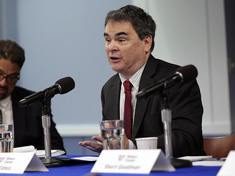-
Should the UN Security Council Take Up Climate Security Issues? Ken Conca on Institutional Change
May 20, 2016 By Sean Peoples As the dust settles on the newly minted Sustainable Development Goals (SDGs) and Paris climate agreement, countries have begun tackling operational questions aimed at limiting global warming to two degrees Celsius and ensuring peaceful, sustainable development.
As the dust settles on the newly minted Sustainable Development Goals (SDGs) and Paris climate agreement, countries have begun tackling operational questions aimed at limiting global warming to two degrees Celsius and ensuring peaceful, sustainable development.As the dust settles on the newly minted Sustainable Development Goals (SDGs) and Paris climate agreement, countries have begun tackling operational questions aimed at limiting global warming to two degrees Celsius and ensuring peaceful, sustainable development.
“Paris and the SDGs really do define the landscape for better or for worse,” says Ken Conca, director of the Global Environmental Politics Program at American University, in this week’s podcast. In addition to operational questions at the country level, it remains to be seen how international institutions, like the United Nations, will adjust to the commitments and principles laid out in these agreements.
Conca said the existing United Nations mandate articulates a clear four-part mission: to promote peace, development, human rights, and international law. But “if you look at the history of environmental initiatives in the UN,” he says, “the UN really only stands on two of its four legs.” According to Conca, there is a lot of work on development and international law, but “until recently, there’s been very little on peace and conflict and the environmental linkages.”
“If you really want to be able to do risk assessment in a whole of governance and strategic and forward-looking way, it requires a combination of institutional reform and political leadership,” Conca explains.
The few open, high profile conversations about climate change and security by the UN Security Council over the last decade were led by Britain (2007) and Germany (2011) as they rotated into the chairmanship. But those conversations, according to Conca have been highly contentious as well as rife with institutional jockeying and confusion. There is ongoing debate whether the responsibility for addressing climate-related security issues lies with the Framework Convention on Climate Change, a forum for climate negotiations, or the Security Council, which authorizes military actions and sanctions.
Regardless of which UN organization ultimately has primary responsibility, “it’s going to be really important to have a capable and functional Security Council on the questions of climate change and international conflict,” Conca says.
Focusing on the ends rather than the means may help. Establishing and protecting rights could be a catalyst for effective implementation where institutional reform falls short. “To me, it’s people as rights holders in the context of these challenges that really ultimately provides us with the political energy as opposed to the desired foresight of governments,” Conca says. “I think rights-based approaches really help us establish priorities.”
Ken Conca spoke at the Wilson Center on May 6, 2016.
Friday Podcasts are also available for download on iTunes and Google Podcasts.
 A Publication of the Stimson Center.
A Publication of the Stimson Center.

 As the dust settles on the newly minted Sustainable Development Goals (SDGs) and Paris climate agreement, countries have begun tackling operational questions aimed at limiting global warming to two degrees Celsius and ensuring peaceful, sustainable development.
As the dust settles on the newly minted Sustainable Development Goals (SDGs) and Paris climate agreement, countries have begun tackling operational questions aimed at limiting global warming to two degrees Celsius and ensuring peaceful, sustainable development.

